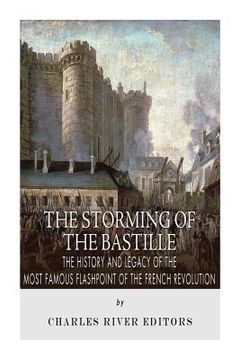The Storming of the Bastille: The History and Legacy of the Most Famous Flashpoint of the French Revolution (en Inglés)
Reseña del libro "The Storming of the Bastille: The History and Legacy of the Most Famous Flashpoint of the French Revolution (en Inglés)"
*Includes pictures *Describes the history of the Bastille before the French Revolution *Includes accounts of the storming of the Bastille by one of the defenders *Includes a bibliography for further reading *Includes a table of contents As one of the seminal social revolutions in human history, the French Revolution holds a unique legacy, especially in the West. The early years of the Revolution were fueled by Enlightenment ideals, seeking the social overthrow of the caste system that gave the royalty and aristocracy decisive advantages over the lower classes. But history remembers the French Revolution in a starkly different way, as the same leaders who sought a more democratic system while out of power devolved into establishing an incredibly repressive tyranny of their own once they acquired it. The French Revolution was a turbulent period that lasted several years, but the most famous event of the entire revolution came near the beginning with the storming of the Bastille. Throughout the day on July 13, 1789, rumors of an impending attack by the French army spread through the city of Paris. A large mob formed, first taking some 28,000 rifles from the Invalides, the veterans' hospital in the city, and in search of powder for the rifles, the mob stormed the Bastille, an old and largely unused prison in the city. While the Bastille, with its imposing turrets and fort-like construction, was a symbol of oppression, their intent was less political and more practical; they needed ammunition, and the prison was under relatively light guard with only a few prisoners. The guards first attempted to negotiate with the group, hoping to buy time for extra troops to arrive, but finally the guards fired on the mob when negotiations failed. Hundreds in the mob were killed, and when additional troops arrived, rather than defending the Bastille, they joined with the mob, providing canons and soldiering skills to ensure the success of the people over the Bastille guards. Late in the afternoon, the Bastille guards surrendered and were killed by the mob, while future revolutionaries like Robespierre supported the actions of the mob as a reflection of the will of the people, even when they killed the governor of the Bastille. News of the incident at the Bastille reached the royal palace of Versailles the same day, but King Louis XVI did not respond or act, even when the Assembly requested he pull back troops from the city. Indeed, the royal response was mixed, with Queen Marie Antoinette favoring military action to put down the rebellion at once while Louis XVI continued to hope for some sort of peaceful solution. Louis eventually agreed to pull the troops back on the afternoon of July 15, and after some of his troops had joined the mob at the Bastille, Louis XVI now understood that he could not trust or rely upon the army. When he asked if it was a revolt, he was famously told that it was a revolution, and as news of the violence spread throughout the country, revolutionary groups took control of many city governments. Grain shortages led to outright rebellion in some areas as hungry people broke into granaries and landlords' estates, and pillage, destruction and arson impacted towns, cities and small rural communities throughout France. With that, the stage was set for the French Revolution to take its course. The Storming of the Bastille analyzes the history and legacy of one of the French Revolution's seminal events. Along with pictures of important people, places, and events, you will learn about the storming of the Bastille like never before, in no time at all.

